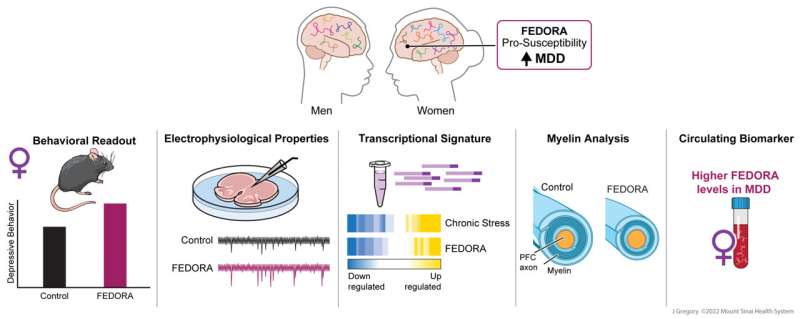December 12, 2022 report
Discovery might explain why women are more likely to be diagnosed with clinical depression than men

A team of researchers at the Icahn School of Medicine at Mount Sinai, working with colleagues from several other U.S. institutions, has found a possible RNA-related clue that might explain why approximately twice as many women are diagnosed with chronic depression as men.
The group describes the connection between long non-coding RNA (lncRNA) and depression in their paper published in the journal Science Advances.
Prior research has shown that the purpose of RNA is to assist genes in making proteins. And lncRNA has been found to interact with RNA, certain proteins, and DNA to conduct other types of gene expression that are not well understood.
In this new effort, the researchers looked at a type of lncRNA called FEDORA, as prior research showed it might be connected to depression. Their work involved studying the brains of people who had recently died, focusing most specifically on those who suffered chronic depression.
The researchers compared levels of FEDORA in women versus men, both those who had been diagnosed with chronic depression and those who had not. They also looked at differences in people who had been prescribed ketamine as a therapeutic for their depression. They found the highest levels of FEDORA in female patients known to be suffering from chronic depression. They also found lower levels for such women who were taking ketamine.
The researchers also tested FEDORA levels of patients who were still alive by taking blood samples and found higher levels for females suffering from depression compared to females not suffering from depression and men in general.
The researchers also genetically programmed test mice to express higher than normal amounts of lncRNA and found that doing so led to higher levels of FEDORA and more symptoms of both anxiety and depression—but only in female mice.
The researchers suggest the gender differences they found are more likely due to differences between genders rather than differences in hormone levels.
More information: Orna Issler et al, The long noncoding RNA FEDORA is a cell type– and sex-specific regulator of depression, Science Advances (2022). DOI: 10.1126/sciadv.abn9494
© 2022 Science X Network





















